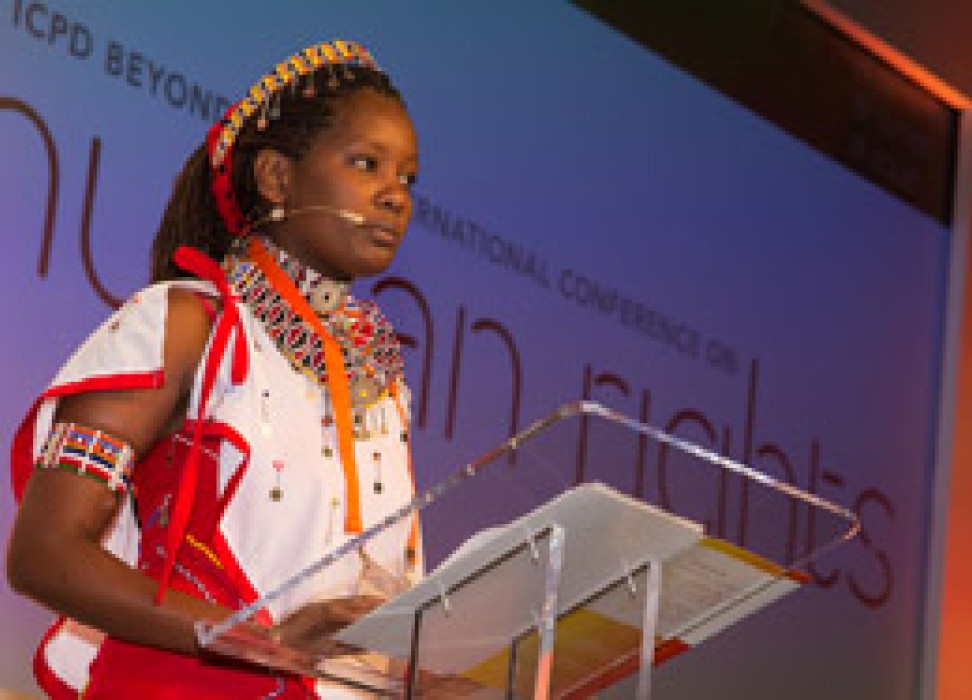A woman’s mission to eliminate the tradition of FGM in her Kenyan community
21 August 2013

It is estimated that more than 125 million girls and women in 29 countries have undergone Female Genital Mutilation (FGM/C) and 30 million are still at risk of FGM/C in the next decade, according to UNICEF’s recent study on FGM/C. Nice Nailantei Lengete, a 22-year-old indigenous woman from Kenya is working in her Maasai community to stop the traditional ritual of FGM/C.
“We are a proud people...proud of our traditions and our identity,” Lengete recently said during her keynote speech at the ICPD Beyond 2014 International Conference on Human Rights. “Yet in the process of preserving our culture we have embraced a system that denies women basic human rights: the right to control her body, the right to an education, to choose whom and when to marry and the right to express an opinion.”
The ICPD International Conference on Human Rights, which was held in the Netherlands in early July, was hosted by the Government of the Netherlands in partnership with the United Nations Population Fund (UNFPA) and the United Nations Human Rights Office. Part of the United Nations mandated review of the implementation of the 1994 International Conference on Population and Development (ICPD) Programme of Action, the Conference addressed the current issues in advancing sexual and reproductive health rights through interactive panel discussions and workshops.
During the closing of the Conference, UN Human Rights Deputy High Commissioner Flavia Pansieri reflected on the progress made in the past 20 years, as well as the “unfinished business” in reproductive and sexual health rights including early child marriage, education for women, and sexual violence. “This means that as long as even a single right of a single individual is being repressed we still have work to do,” she said.
Marijke Wijnroks, Conference chair and Deputy Director for Social Development and the Netherlands’ Ambassador for HIV/AIDS and Sexual and Reproductive Health and Rights, also said that human rights’ violations can’t be justified in the name of culture or tradition. “Rights related to sexuality and reproduction are universal human rights, meaning that they are the right of every single human being, irrespective of race, sex, ethnicity, religion, political or other opinion, or any other status,” she said.
According to UNICEF, the practice of FGM/C is in a sharp decline. UNICEF conducted a 20-year study on FGM/C in 29 countries across Africa and the Middle East. The report revealed for the first time how widespread the practice is and why the practice is still prevalent. According to the study, the younger generation of girls will be less likely to undergo FGM/C because they are more educated and aware of the risks. Even though there has been a shift in attitude towards FGM/C, social acceptance is the dominant reason why people support the practice. But attitudes toward the practice are slowly changing. For instance, in Kenya, 59 per cent of girls and women who have been cut do not see any benefit to FGM/C.
The Committee on the Elimination of Discrimination against Women’s (CEDAW) General Recommendation No.14 raises concerns over the continuing practice of FGM/C and calls on States to “take appropriate and effective measures with a view to eradicating the practice of female circumcision.”
However, the practice still continues. According to Lengete, Masaai girls as young as 12 are denied their basic human rights when they are subjected to FGM/C, told to leave school, and forced to enter into early marriage. Lengete was able to lead a different path because she became an orphan at 8-years-old, which meant that she didn’t have her parents to force it on her. “Sure my uncle tried to organize it, to literally beat me into submitting to the cut, but I resisted. I ran away,” she said.
In 2008, her community opened a door for her when she was given an opportunity to participate in the Nomadic Youth Reproductive Health Project, a program sponsored by the African Medical and Research Foundation (AMREF) that provides training on the health risks from FGM/C and early marriages. This is when she began to understand the importance of sexual health rights. She also knew it was vital to educate the Masaai women about their freedom to choose.
“I knew that change must come from within communities,” Lengete said. She soon realized in order to make this change happen, she would have to go to the elders and share what she had learned during her training. “And amazingly they listened. To me, Nice,” she said. The elders were able to connect her with the Morans, the young Masaai men who will eventually become the leaders in the community. “Without their support, introducing new traditions would have been futile,” she explained.
When the Morans’ chief presented her with the black walking stick that symbolizes leadership, she knew she had made a breakthrough. “I helped the Morans understand the need for using condoms, going for treatment for sexually transmitted infections and taking HIV tests,” Lengete said. “I asked them to support new rites of passage we were introducing for women.” She continues to advocate for the women in her community and educate them on their rights.
Lengete said that her personal driver for being assertive in a male dominated community was the faith in knowing that women could eventually be seen as human beings and “girls can become women without the cut.”
21 August 2013

